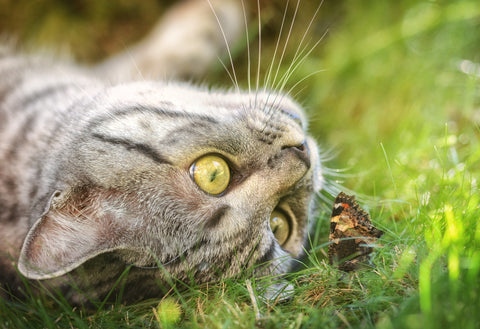At any point in time it can be said that we are where our attention is.
Have you ever had the experience of reading the same page of a book over and over because your attention wanders in directions you can’t seem to control?
What about the experience of having your eyes wide open while being engaged in deep thought or daydreaming, and then realizing that even though your eyes were open you weren’t really looking at anything?
These experiences are very simple examples of how misplaced attention can distort our reality. They’re direct examples of the lack of control we have over our attention.
Our attention; the placement or focus of our consciousness is just as much a muscle as the muscles in our physical body.
In order to realize the potential strength our attention contains, we have to work it consistently with a direct aim in mind.
How To Improve Focus Effectively
We usually use the words “focus” and “attention” as synonyms, but there is a stark difference between the two. Understanding the difference is important to learning how to control the attention and consequently improve our ability to focus.
The Difference Between Focus & Attention
Focus is generally defined as a ‘state or quality of clarity.’
Attention is generally defined as ‘awareness.’
Our attention never ceases for a moment. We are always attentive to something. The focus of our attention is in a constant state of change. This is why it can be said that at any given moment we are where our attention is; where our awareness is. But our attention isn’t always focused; it isn’t always in a state of high quality or clarity.
Speaking more simply, our focus can be described as both the object of our awareness, and the manner in which our attention is given to an object within our awareness.
Seeing that our focus is the object of our awareness is quite simple – When there is a plant in front of me and I bring the seeing of that plant into my awareness, that plant becomes the focus of my awareness. It becomes what’s clear in my awareness.
Understanding that focus also describes the manner in which our attention is given to an object within our awareness is a little more difficult.
Back to our plant example above. When I become aware of the plant, the plant comes into my attention. The plant then becomes my focus (a subset of my attention). But my focusing on the plant also includes HOW my attention focuses on the plant. While focusing, does the beauty of the plant come to mind? The biology of it? It’s shape and color? The way it’s rooted into the floor?
HOW do I focus on the plant?
In practicing to control or ‘work out’ our attention, we should always keep in mind both the object we want to focus on, and how we focus on the object.
Focus is concentrated attention, but our attention has the potential to include many things at the same time.
Why Is It So Difficult To Focus?
Most of us generally think, and live our lives with the belief that we basically have control over our attention. But we all know what it feels like to not be able to concentrate on something. To feel out of it, mentally foggy, or in a mental frenzy.
Why exactly is it difficult to control the placement of our attention for more than a few moments?
- Negative Emotional states
Functional brain imaging has revealed to us that negative emotional states largely inhibit our ability to focus or do work with our mental or intellectual faculty. Problem-solving and creative thinking become difficult because our mind is in a state similar to that of being approached by an external threat.
In other words, the manner in which our attention is given to the object we’d like to focus on is distorted by the negative emotions.
- Our Energy Levels
When we’re exhausted, it’s hard to focus our attention. That’s not a foreign concept to anybody. What we don’t realize though is that every thought, emotion, physical movement and instinctive function that happens automatically in our body ALL require energy. Much of our energy can be lost in daydreaming, for example. Another example is the feeling of exhaustion that kicks in right after we’ve become enraged with anger.
We spend a lot more energy than is necessary in the course of a day, much of which could potentially be used to focus when we need it.
- External Distractions
A distraction is literally “a thing that prevents someone from giving full attention to something else.” Nowadays it seems almost impossible not to be distracted when we’re trying to focus. Our phones and computers are so much a part of our lives – the internet, notifications from applications, etc. are all one enormous distraction that’s extremely difficult to avoid.
Even if you can somehow pass the first layer of electronic/social media distraction, you then have the ordinary distractions like other people and outside noise that can make focusing difficult.
Also included as distractions are our own thoughts and moods which seem to wander aimlessly much of the time.
Our attention is constantly responding automatically to our internal and external environment through associative reactions. We don’t even realize how our attention is taken from the sound of a car locking that is similar to my own car, and how I can all of the sudden find myself thinking about the next car I’m going to buy for 10-15 minutes.
We basically find ourselves in the random thought, not knowing how we got there, and then trying to concentrate all over again until the same thing happens.
- Timing
This is in a way connected to the other large impediments to focusing, but deserves its own conversation. Each one of us knows that there are specific times our brains work best. Times when it’s easier to focus because there are less distractions and we simply have the mental energy needed to concentrate for longer than usual.
Methods for Practicing Controlled Attention
We can practice focusing our attention with ANYTHING. While doing the dishes, working, cooking, walking, gardening, having a cup of coffee… literally anything.
The goal is always the same – to be with what we’re doing and to let what we’re doing guide our attention and remain the object of our focus.
- Intensely Focused Reading
Reading while trying to maintain intense focus is one of the best exercises for the attention. When we’re usually reading there is a LOT that sort of stands in between us and actually paying attention to the words we’re reading. All of that stuff is a part of the HOW we give our attention.
We know the book should be the object of our attention – the focus – but all of our thoughts, the external noise, etc. quite literally form static that shades our impression of the words on the book we’re repeating in our minds.
Here’s what you do:
-
Commit to serious intensity for a short period of time (5-10 minutes).
-
Make sure there are NO external distractions (no outside noise or people to bother you)
-
Whenever you see your thoughts aren’t with the book, gently bring them back to the words on the page.
-
When you see that you’re thinking about not being focused, remember that the voice in your head isn’t your active thinking.
-
Whatever happens inside of your mind, bring your attention back to the words on the page until you’ve read about half a page to one whole page without allowing other thoughts into your mind.
-
Do this every day and as it gets easier, increase the amount of time you do it for.
In a way, you have an opportunity to enter into a state in which you observe your own thoughts as they happen, while keeping your primary focus on reading.
2. Balance Your Emotions
I explained how negative emotions hijack our attention so that focus becomes exceedingly difficult and sometimes impossible. Becoming a person who takes active steps towards balancing his or her emotions regularly will improve your ability to focus for life.
What’s more is that the same way negative emotions hinder our ability to focus, positive emotions can improve concentration.
Exercise is a great way to force positivity out of your body and thus give you the ability to concentrate better in general.
Meditation is another extremely useful option to help balance the emotions. Meditation will actually help increase your focus by keeping your emotions balanced, and at the same time serving as its own exercise on practicing directed attention. The same way you can tune out all the static of the mind when reading to practice focusing, you can work with placing your attention on the sensation of the breath or body and make an effort to stay with it for a designated period of time.
- Avoid distractions at all costs
Sounds obvious and commonplace, but we all know its easier said than done. When you need to focus, what’s the point in having your phone on loud? Why keep notifications on your computer or phone on? Don’t place yourself in position to fail – there are enough impediments to intense concentration. You know what distracts you personally. Do your best to limit it when you need to focus.
Another important point here is to do your absolute best to not buy into a distraction even if it gets to you. For example, you hear your phone buzz. You can either let that fact be and relatively easily return to your work or you can turn it over and see who messaged you, what it was about, respond to them and wait for a return response. The latter option makes it much more difficult to return to even TRYING to focus.
Do your best to minimize acting on distractions.
- Practice Strengthening Focus When It’s Easiest To Do So
If we want to focus effectively, then we have to utilize time to our advantage. Don’t practice strengthening your focus when you’re tired. Do it when your brain works best; when you’re fresh.
Also, you’re most likely to make a true practice out of it if you do it around the same time every day and at a time that you actually gain the benefits you seek.



